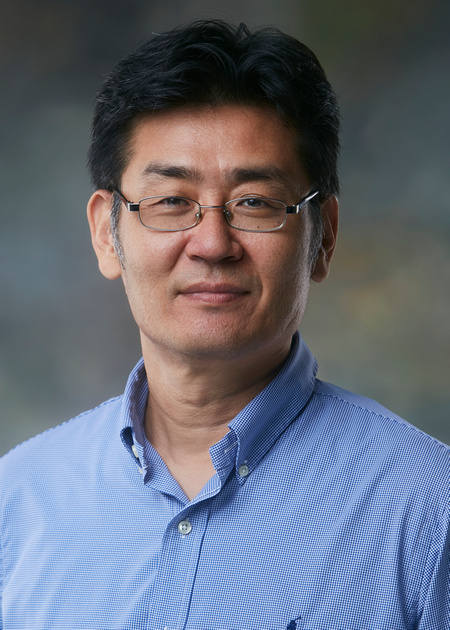
Contact
- 210-567-3913
- chois5@uthscsa.edu
Department
Microbiology, Immunology & Molecular GeneticsChoi, Seung-Chul, Ph.D.
Associate Professor, Research
Personal Statement:
Dr. Choi obtained his PhD in Biology (Immunology) from the Chonbuk National University, the republic of Korea. During his Ph.D. course, Dr. Choi focused on understanding the differentiation of dendritic cells (DC) from human monocytes using differently expressed genes. Dr. Choi had a postdoctoral training in the laboratory of Dr. John Coligan at the National Institute of Allergy and Infectious Diseases / National Institutes of Health working on the identification of the ligands and function of orphan lymphoid/myeloid cell inhibitory receptors. In 2013, he joined the laboratory of Dr. Laurence Morel at the University of Florida, and then Dr. Choi and Dr. Morel moved the department of Microbiology, Immunology & Molecular Genetics at the University of Texas Health Science Center at San Antonio in 2022. Dr. Choi focus to address the understanding of autoreactive T and B cells in lupus pathogenesis.
Education
2000 – 2002 (Master of Science) Division of Biological Science, Chonbuk National University, Korea.
2003 – 2007 (Doctor of Philosophy) Division of Biological Science, Chonbuk National University, Korea
2007 – 2013 Visiting Fellow, Laboratory of Immunogenetics, National Institute of Health (NIH), USA
2013 – 2017 Postdoctoral Associate, Department of Pathology, Immunology and Laboratory Medicine, College of Medicine, University of Florida, USA
2017 – 2022 Research Assistant Scientist, Department of Pathology, Immunology and Laboratory Medicine, College of Medicine, University of Florida, USA
Research
Active grants:
- R01 AI045050 Morel (PI) 6/20/2018-5/31/2023 National Institutes of Health $2,808,667 total Characterization of SLE-susceptibility loci on mouse chromosome 1 Role: Co-Investigator
- R01 AI143313 Morel (PI) 01/11/2019-12/31/2023 National Institutes of Health $2,239,417 total Gut dysbiosis and tryptophan metabolism in lupus. Role: Co-Investigator
- R01 AI154630 Morel (PI) 07/08/2020-06/30/2025 National Institutes of Health $2,239,417 total Determinants of follicular helper T cell expansion in lupus. Role: Co-Investigator
Awards & Accomplishments
2002 – 2003 Recipient of post-master fellowship award from Korea Science and Engineering Foundation (KOSEF), Korea
2007 – 2013 Recipient of visiting fellow award from NIH, USA
2014 Travel Award at American Association of Immunologists (AAI) Annual Meeting
2015 Travel Award at American Association of Immunologists (AAI) Annual Meeting
2016 Trainee Abstract Award at American Association of Immunologists (AAI) Annual Meeting
2017 Travel Award at American Association of Immunologists (AAI) Annual Meeting
Publications
List of all publications:
https://www.ncbi.nlm.nih.gov/myncbi/1zYWcrMOP-M5j/bibliography/public/
- Choi SC, Xu Z, Li W, Yang H, Roopenia DC, Morse HC 3rd and Morel L. Relative contribution of B cells and dendritic cells from lupus-prone mice to CD4+ T cells polarization. Journal of Immunology 200(9):3087-3099 (2018)
- Abboud G, Choi SC, Kanda N, Zeumer-Spataro L and Morel L. Inhibition of glycolysis reduces disease severity in an autoimmune model of rheumatoid arthritis. Frontiers in Immunology 9;1973 (2018) (*equally contributed)
- Choi SC, Titov AA, Abboud G, Seay HR, Brusko TM, Roopenia DC, Salek-Ardakani S and Morel L. Inhibition of glucose metabolism selectively targets autoreactive follicular helper T cells. Nature Communications 9(1):4369 (2018)
- Li W, Qu G, Choi SC, Cornaby C, Titov AA, Kanda N, Teng X, Wang H and Morel L. Targeting T cell activation and lupus autoimmune phenotypes by inhibiting glucose transporters. Frontiers in Immunology 10:833 (2019)
- Choi SC, Brown J, Gong M, Ge Y, Zadeh M, Li W, Croker BP, Michailidis G, Garrett JT, Mohamadzadeh M and Morel L. Microbiota-associated tryptophan catabolism induces autoimmune activation in a mouse model of lupus. Science Translational Medicine 12; eaax2220 (2020) (*equally contributed †corresponding author)
- Li W, Elshikha SA, Cornaby C, Teng X, Abboud G, Brown J, Zou X, Zeumer-Spataro L, Robusto B, Choi SC, Fredenburg K, Major A and Morel L. T cells expressing the lupus susceptibility allele Pbx1 enhance autoimmunity and atherosclerosis in dyslipidemic mice. JCI Insight 5(11):e138274 (2020)
- Cornaby C, Elshikha SA, Teng X, Choi SC, Davidson A, and Morel L. Efficacy of the combination of metformin and CTLA4Ig in the (NZB x NZW)F1 mouse model of lupus nephritis. ImmunoHorizons 4(6):319-331 (2020)
- Li W, Gong M, Park YP, Elshikha SA, Choi SC, Brown J, Kanda N, Yeh WI, Titov AA, Teng X, Brusko TM, and Morel L. Lupus susceptibility gene Esrrg modulates the development and function of regulatory T cells through mitochondrial metabolism. JCI Insight 6(14):e143540 (2021)
- Choi SC, Li W, Zhang X, Kanda N, Zeumer-Spataro L, Teng X, and Morel L. Pharmacologically inferred glycolysis and glutaminolysis requirement of B cells in lupus-prone mice. Journal of Immunology 208(9):2098-2108 (2022)
- Brown J, Abboud G, Choi SC, Kanda N, Garrett T, Perl A, Chervonsky A, Mandik-Nayak L, and Morel L. Tryptophan metabolites produced by intestinal bacteria modulate CD4+ T cell phenotypes in lupus-prone mice. iScinece 25(5):104241 (2022)
- Zou X, Choi SC, Zeumer-Spataro L, and Morel L. Metabolic regulation of follicular helper T cell differentiation in a mouse model of lupus. Immunology Letters 247:13-21 (2022)
- Elshikha SA, Teng X, Kanda N, Li W, Choi SC, Abboud G, Terrell M, Fredenburg K, and Morel L. TLR7 activation accelerates cardiovascular pathology in a mouse model of lupus. Frontier Immunology 13:914468 (2002)
